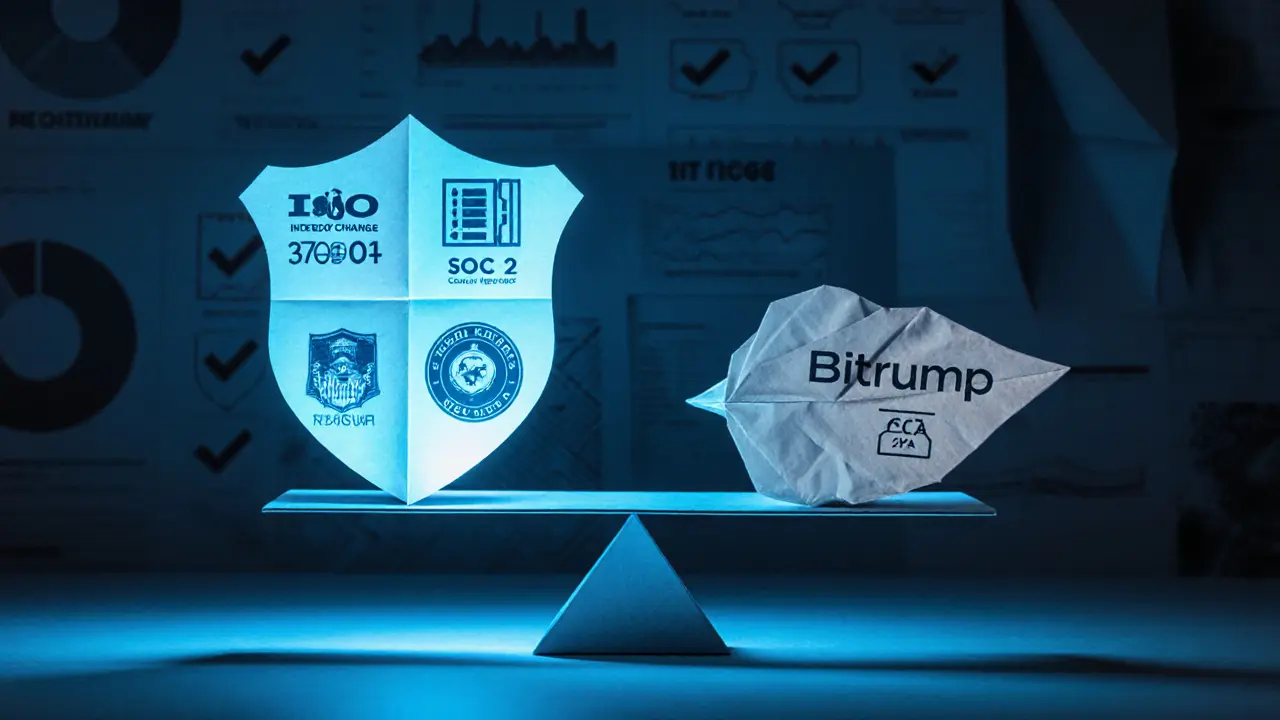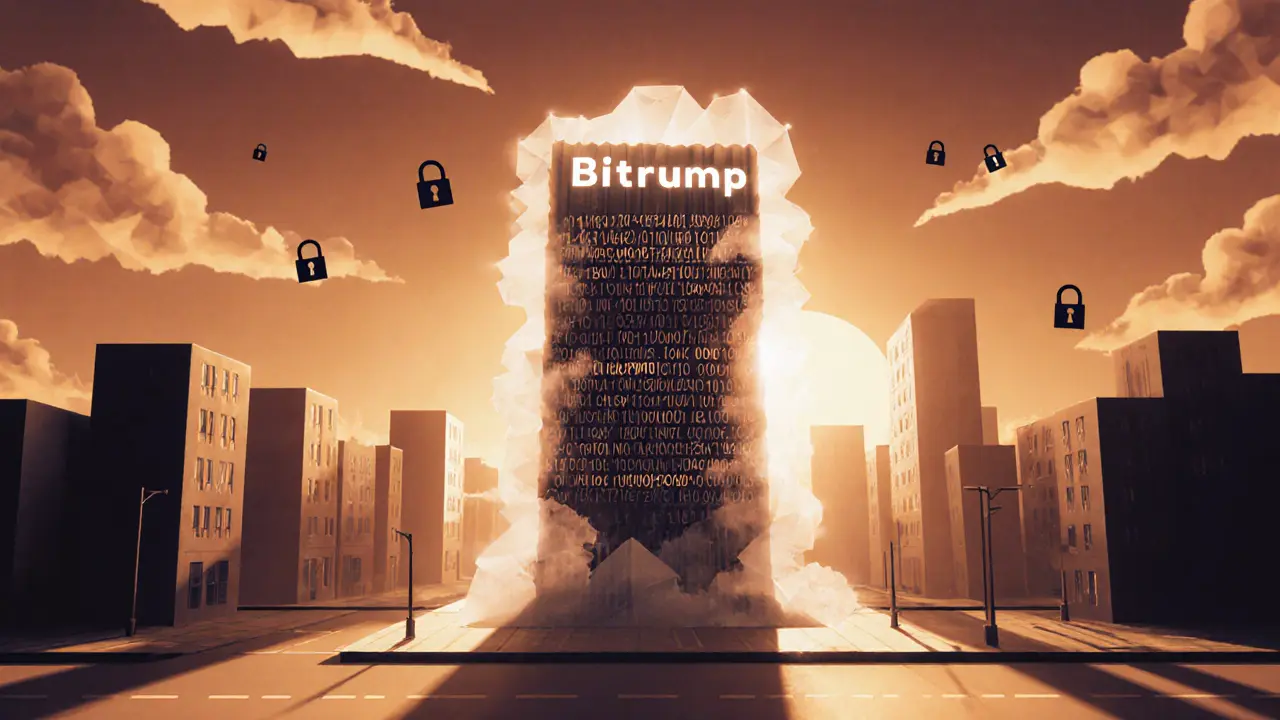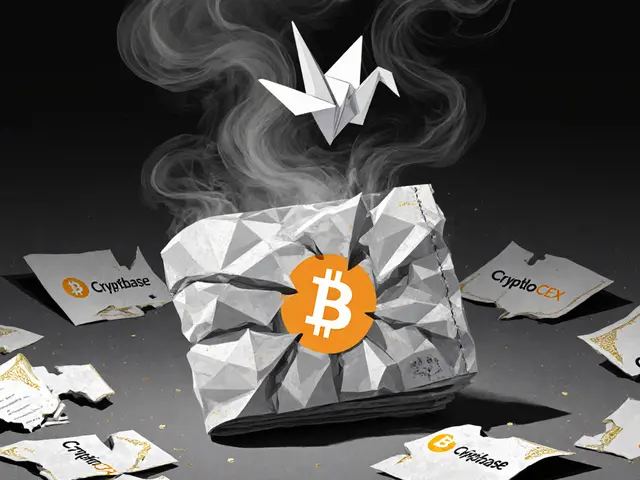Crypto Exchange Legitimacy Checker
Use this tool to assess whether a cryptocurrency exchange meets key legitimacy criteria. Enter details about the exchange below:
Analysis Results
Security Checks
Regulatory Checks
When a new crypto platform pops up with a catchy name, the first question investors ask is: Bitrump crypto exchange review. Is it a trustworthy gateway to digital assets or just another flash‑in‑the‑pan project? This article breaks down everything you need to know before depositing any funds - from the basics of who runs Bitrump, to the security measures you should expect, and the regulatory red flags that scream “stay away”.
TL;DR Summary
- Bitrump has virtually no public footprint: no founding date, team bios, or audit reports.
- Reputable exchanges like Kraken publish security certifications (ISO/IEC27001, SOC2) and cold‑storage stats; Bitrump provides none.
- U.S. regulators (SEC, OFAC) require clear licensing and AML procedures - Bitrump’s status is unclear.
- Without independent audits or a verifiable corporate entity, the risk of loss is high.
- Consider established platforms with proven security and compliance before using Bitrump.
What Is Bitrump?
Bitrump is an online cryptocurrency exchange that claims to offer low‑fee trading of major digital assets. The service surfaced on forums in early 2025, but official documentation - such as a registered business address, founder names, or a whitepaper - is missing from public records.
How Legitimate Exchanges Build Trust
To understand why Bitrump’s silence matters, compare it with industry standards. Below is a quick look at what reputable platforms typically publicize.
| Factor | Kraken (example) | Bitrump |
|---|---|---|
| Founding Year | 2011 | Not disclosed |
| Regulatory Licenses (US, EU) | FinCEN, FCA, BaFin | None listed |
| Security Certifications | ISO/IEC27001, SOC2 Type1 | None reported |
| Two‑Factor Authentication | FIDO2‑compatible Passkeys, no SMS recovery | Basic 2FA (SMS only) |
| Cold Storage Ratio | 97% of assets in offline vaults | Unspecified |
| Public Audits | Annual third‑party code audit | No audit disclosed |
The gaps are stark: where Kraken publishes verifiable data, Bitrump leaves you guessing.
Security Basics Every Exchange Should Have
Security isn’t a buzzword - it’s a set of concrete practices. Below are the pillars most reputable platforms adopt.
- Cold storage keeps the majority of user funds offline, shielded from hackers. Leading exchanges store 90%+ of assets in air‑gapped vaults.
- ISO/IEC 27001 is an international information‑security management standard, demonstrating systematic risk management.
- SOC 2 Type 1 reports on controls related to security, availability, processing integrity. It’s a third‑party audit many U.S. exchanges publish.
- FIDO2 enables password‑less, hardware‑based authentication, reducing phishing risk. Exchanges that support FIDO2 typically disable SMS‑based recovery.
- Real‑time monitoring of withdrawal attempts, IP geofencing, and rate‑limiting protect against bot attacks.
Bitrump’s public materials only mention a basic email‑plus‑SMS two‑factor login. No mention of cold storage, ISO/IEC27001, SOC2, or FIDO2. That omission alone raises a red flag.

Regulatory Landscape in 2025
The U.S. Securities and Exchange Commission (SEC) now runs a dedicated crypto task force that expects exchanges to register, disclose custody practices, and implement AML/KYC protocols. The Office of Foreign Assets Control (OFAC) also requires crypto platforms to screen transactions against sanctions lists.
Legitimate platforms display their registration numbers, compliance certificates, and often link to the SEC’s investor‑alert pages. Bitrump provides no such evidence. A quick search of the SEC’s public registry yields no filings for a company named Bitrump.
Red Flags Specific to Bitrump
- No verifiable corporate entity. The domain registration is privacy‑protected, and WHOIS shows no address.
- Lack of third‑party audits. Security firms like Trail of Bits or Kudelski Labs rarely release reports for Bitrump.
- Unclear fee structure. The website lists “competitive fees” but no exact percentages or tiers.
- Customer support anonymity. Support tickets are answered by generic “[email protected]” without a name or escalation process.
- Absence from reputable rankings. Bitrump does not appear on CoinMarketCap’s exchange list, CryptoCompare, or the “Best Crypto Exchanges 2025” round‑ups.
Each point alone might be explainable for a brand‑new startup, but together they paint a picture of an exchange that has not earned public trust.
What You Can Do Before Using an Unknown Exchange
Even if you’re attracted by low fees, a few quick checks can save you from a costly mistake.
- Search the exchange name in the SEC’s Investment Adviser Public Disclosure database.
- Look for independent security audits on GitHub or security‑firm websites.
- Verify the company’s registration on the Financial Crimes Enforcement Network (FinCEN) or relevant EU regulator.
- Test the two‑factor login - does it rely on SMS or hardware keys?
- Read community feedback on Reddit, Bitcointalk, and Trustpilot; watch for repeated “withdrawal blocked” complaints.
If answers are missing or vague, treat the platform as high risk.
Bottom Line: Proceed with Extreme Caution
Based on the lack of publicly available information, missing security certifications, and no clear regulatory standing, Bitrump falls short of the baseline expectations for a safe crypto exchange. While it’s possible the platform is a brand‑new operation still building its compliance framework, the odds favor a “stay away until proven” stance.
For most traders, especially retail investors, the safest path is to stick with exchanges that publish:
- Founding date and corporate registration.
- Security certifications (ISO/IEC 27001, SOC 2) and cold‑storage percentages.
- FIDO2‑compatible two‑factor authentication.
- Clear licensing from the SEC, FCA, or other regulator.
Until Bitrump can match those standards, the risk of losing funds outweighs any potential fee savings.
Frequently Asked Questions
Is Bitrump a registered cryptocurrency exchange?
Public records and the SEC’s registry show no evidence of Bitrump holding any official license or registration. Without a listed regulator, the exchange’s legal standing is uncertain.
What security features should I look for before trusting an exchange?
Key features include cold storage for the majority of assets, ISO/IEC 27001 or SOC 2 certifications, FIDO2‑compatible hardware authentication, no reliance on SMS for account recovery, and regular third‑party security audits.
Can I trade on Bitrump if I’m based in the US?
Since Bitrump does not disclose any US regulatory compliance (FinCEN, SEC registration), US residents risk violating local laws by using the platform. It’s safer to choose an exchange that explicitly supports US clients.
How can I verify an exchange’s audit reports?
Reputable exchanges host audit PDFs on their website or link to the audit firm’s page. You can also request the report directly from support and cross‑check the auditor’s credentials.
What should I do if I suspect a scam exchange?
Stop depositing funds immediately, document all communications, and report the platform to your local financial authority (e.g., the SEC or FCA). If you’ve lost money, file a complaint with the relevant consumer‑protection agency.





Raj Dixit
Bitrump is just another snake oil operation peddled by unscrupulous hackers. Indian regulators would never let this fly.
Darrin Budzak
I’ve seen a few people dip their toes in newer exchanges and end up regretting it. It’s safer to stick with the big names.
Andrew McDonald
🧐 While the allure of low fees is tempting, the absence of cold storage and ISO certifications is a glaring oversight.
Enya Van der most
Hey folks! If you’re hunting for a reliable platform, think about the security layers-cold vaults, hardware keys, and proven audits. They’re the backbone of trust!
Eugene Myazin
Exactly, Enya! Plus, many reputable exchanges support local fiat deposits, making it easier for newcomers worldwide.
karyn brown
Bitrump looks shady 😕 no real proof they have any security certs. Stay away!
Nilesh Parghi
In the grand scheme, trusting a platform without transparency is like walking blindfolded into a storm. Wisdom says verify before you invest.
Henry Mitchell IV
🤷♂️ Low fees sound good, but if the exchange can’t prove its safety, it’s not worth the risk.
Kamva Ndamase
Listen up! If you value your crypto, demand proof of audits, cold storage percentages, and legit licenses. Anything less is reckless!
bhavin thakkar
When you examine the fundamentals of any exchange, the first question should be: who is behind the curtain? Bitrump offers no founding date, no identifiable leadership, and no corporate registration-a trio of red flags that any seasoned investor would spot instantly. Security claims are merely buzzwords without backing from third‑party audits or ISO certifications. Without cold‑storage metrics, users are left wondering where the majority of their assets actually reside. Regulatory compliance is another blind spot; a legitimate platform proudly displays its FINCEN, SEC, or FCA registrations, yet Bitrump remains silent. The lack of transparent fee structures suggests potential hidden costs that could erode profits. Customer support, limited to an anonymous email address, offers no escalation pathway for disputes. Community feedback on forums is sparse, a typical hallmark of platforms that either are brand new or attempting to hide failures. The absence from reputable ranking sites compounds the suspicion. In crypto, trust is earned through verifiable data, not marketing slogans. Until Bitrump publishes audited security reports, detailed cold‑storage percentages, and clear licensing information, it operates in a gray zone. Investors should treat it as a high‑risk venture and allocate only capital they can afford to lose. Diversifying across established exchanges mitigates exposure to a single point of failure. Remember: the convenience of low fees does not outweigh the fundamental need for security and compliance. Proceed with extreme caution, and consider waiting for concrete evidence before depositing any funds.
Thiago Rafael
From a regulatory perspective, any exchange operating without FINCEN or SEC registration exposes users to legal uncertainties and potential enforcement actions.
Janelle Hansford
I’ve personally moved my holdings to exchanges that publish their audit reports, and the peace of mind is priceless.
dennis shiner
Sounds like a scam to me.
Maggie Ruland
Oh sure, let’s trust a mystery shop with our life savings-what could possibly go wrong?
Joyce Welu Johnson
If you’re still curious, check the exchange’s WHOIS data, look for third‑party audit PDFs, and read community threads for any red‑flag reports before committing any funds.